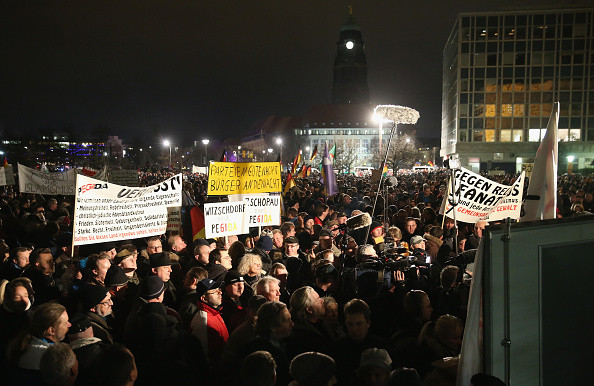Germany Pegida: Growing fears of 'far-right extremists' as 15,000 join anti-Islam protest

Fears are growing that far-right movements are expanding in Germany as at least 15,000 people took to streets of Dresden to protest against the increasing immigration of Muslims in the country.
The protest, organised by Patriotic Europeans against the Islamisation of the West (Pegida), is the latest in a spate of rallies held across the country against what is perceived as the "Islamisation" of Germany.
The organisation was created in October in retaliation to a plan to build 14 centres for roughly 2,000 refugees in Dresden and it has been criticised by many, who argued it is "dangerous" and could "tarnish Germany's reputation".
Germany's Justice Minister Heiko Maas, of the Social Democrats, has called the movement a disgrace for the country.
Thomas Jaeger, a political scientist at Cologne University said: "It [Pegida] is also extremely dangerous for Merkel because a political movement is now opening up to the right of her conservative party and that had never happened before."
Pegida wishes to distance itself from neo-Nazi groups in the country, and on its Facebook page it states that it aims to ensure that all "German children can grow up in a cosmopolitan and friendly nation" and it "refuses to allow the spread of activities by groups such as [Islamic State] and al-Qaeda in Europe."
However, some fear the rallies are also drawing far-right supporters and sympathisers. A 35-year-old woman who identified herself only as Heidrun was passing out free copies of the far-right weekly "Junge Freiheit" during the latest demonstration.
Chancellor Angela Merkel has condemned all forms of xenophobia and warned demonstrators to "watch out that they are not instrumentalised by the organisers."
Around 15,000 turn out for Dresden's biggest ever PEGIDA anti-Islam rally http://t.co/eypi3cvWpU via @euronews pic.twitter.com/ex40e9d9bC
— ...david jones (@_dpaj) December 16, 2014
#Pegida 'Patriotic Europeans Against the Islamification of the West' has quickly gained a spreading mass appeal pic.twitter.com/bDMEg26OeG
— Wall Of Pics (@WallOfPics) December 15, 2014Roughly 6,000 demonstrators marched in a separate anti-Pegida rally in Dresden on Monday evening (15 December).
The marches are taking place as the Christian Social Union (CSU) is trying to pass a law requiring immigrants to speak German in public and at home.
According to the proposal, "people who want to remain here on a permanent basis should be encouraged to speak German in public and within the family".
Immigration in Germany
According to latest statistics, Germany has become the second most popular destination for migrants in the world, after the US.
The Federal Statistical Office (Destatis)'s report released in May said that Germany recorded a 13% increase in immigration in 2013 and most migrants come from the European Union. Of the 1,226,000 migrants who reached the country in 2013, 118,000 were nationals returning home.
Turkish people formed the largest foreign-born group in Germany in 2013 (1.5 million), followed by Asians and Polish.
In November, Merkel announced that Germany would not abide strict measures to regulate migration proposed by UK Prime Minister David Cameron.
© Copyright IBTimes 2025. All rights reserved.






















